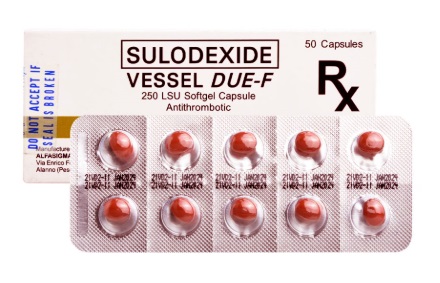Sulodexide Effectively Mitigates Thromboinflammation and Endothelial Damage, Reducing Risks Associated with Long COVID
Nikhil Prasad Fact checked by:Thailand Medical News Team Jan 10, 2025 3 months, 2 weeks, 4 days, 1 hour, 30 minutes ago
Medical News: The long-term impacts of COVID-19 have emerged as a significant public health concern. Beyond the acute respiratory effects, many survivors experience prolonged symptoms collectively known as long COVID. One major factor in this syndrome is vascular damage, particularly endothelial dysfunction. A groundbreaking study involving researchers from Centro Médico del Noroeste (Mexico), University of Szeged (Hungary), Loyola University Medical Center (USA), and CLINEDEM (Mexico) highlights the potential of sulodexide to mitigate these risks. Sulodexide, clinically used for thromboembolic diseases, shows promise in reducing endothelial injury and inflammation associated with long COVID.
 Sulodexide Effectively Mitigates Thromboinflammation and Endothelial Damage, Reducing Risks Associated with Long COVID
The Study and Its Objectives
Sulodexide Effectively Mitigates Thromboinflammation and Endothelial Damage, Reducing Risks Associated with Long COVID
The Study and Its Objectives
The study, published recently, was a double-blind, placebo-controlled trial involving 206 adult patients recovering from moderate to severe COVID-19. Researchers aimed to determine the effects of sulodexide on biomarkers of endothelial dysfunction. Sulodexide, traded as Aterina, is a highly purified mixture of glycosaminoglycans comprising 80% heparan sulfate and 20% dermatan sulfate. Known for its anticoagulant and anti-inflammatory properties, it has been utilized in conditions such as diabetic nephropathy and chronic venous disease.
This
Medical News report delves into how sulodexide could play a crucial role in addressing vascular complications in long COVID.
Key Findings from the Study
Participants were divided into two groups: one receiving sulodexide (250 LRU orally, twice daily) and the other a placebo, over eight weeks. Researchers analyzed biomarkers such as thrombomodulin (TM), von Willebrand Factor (vWF), D-dimer, and interleukin-6 (IL-6).
-Reduction in Thrombomodulin (TM): By the eighth week, patients treated with sulodexide showed a significant reduction in TM levels (25.2 ± 7.9 ng/mL) compared to the placebo group (29.9 ± 14.7 ng/mL, p = 0.03). TM is a key marker of endothelial injury, and its reduction suggests less vascular damage.
-Lower von Willebrand Factor (vWF) Levels: Sulodexide-treated patients had reduced vWF levels (232 ± 131 U/dL) compared to the placebo group (266 ± 122 U/dL, p = 0.02). Elevated vWF is associated with endothelial dysfunction and thrombosis.
-Decreased Inflammation: IL-6, a pro-inflammatory cytokine linked to severe COVID-19 outcomes, was significantly lower in the sulodexide group (12.5 ± 13.2 pg/mL) versus the placebo group (16.2 ± 16.5 pg/mL, p = 0.03).
-D-dimer and CRP Reductions: Sulodexide also significantly reduced D-dimer and C-reactive protein (CRP) levels, markers of thrombosis and inflammation, respectively.
Notably, su
lodexide had no significant effect on other biomarkers such as P-selectin, ICAM-1, and VCAM-1, indicating its targeted impact.
Understanding Sulodexide’s Mechanism
Sulodexide’s efficacy stems from its ability to restore the endothelial glycocalyx - a protective layer crucial for vascular health. It prevents degradation caused by inflammation and helps modulate inflammatory responses. Sulodexide’s dual anticoagulant and anti-inflammatory actions make it particularly suited for addressing long COVID’s vascular complications.
Additionally, sulodexide’s low risk of bleeding - a common concern with anticoagulants - further supports its clinical utility. Previous studies have highlighted its benefits in animal models of reperfusion injury and in conditions such as tinnitus when combined with melatonin or used as a monotherapy.
Implications for Long COVID Management
The findings underscore sulodexide’s potential to mitigate thromboinflammation and endothelial damage, key drivers of long COVID. By reducing critical biomarkers, it could help alleviate symptoms such as fatigue, chest pain, and brain fog associated with vascular dysfunction.
This trial also aligns with prior research demonstrating sulodexide’s effectiveness in improving endothelial function and reducing cardiovascular risks. It presents a viable option for patients recovering from COVID-19, especially those with pre-existing cardiovascular or metabolic conditions.
Safety and Tolerability
The study confirmed sulodexide’s safety profile. Only 8.2% of participants in the sulodexide group reported mild, non-serious adverse events, similar to the placebo group. This tolerability, coupled with its effectiveness, positions sulodexide as a promising therapy for managing long COVID.
Conclusions
Sulodexide offers a novel approach to addressing endothelial dysfunction and thromboinflammation in long COVID patients. The study’s results highlight its ability to reduce key biomarkers such as TM, vWF, IL-6, and D-dimer, suggesting significant vascular protection. For long COVID patients, especially those at high risk due to pre-existing conditions, sulodexide could provide both symptomatic relief and improved long-term outcomes.
Further research is warranted to explore sulodexide’s potential across diverse patient populations and to determine its effectiveness in preventing long COVID when administered early. As the medical community seeks solutions to the complex challenges posed by long COVID, sulodexide’s role appears increasingly promising.
The study findings were published in the peer-reviewed journal: Clinical and Applied Thrombosis/Hemostasis.
https://journals.sagepub.com/doi/full/10.1177/10760296241297647
For the latest COVID-19 News, keep on logging to Thailand
Medical News.
Read Also:
https://www.thailandmedical.news/news/medical-news-polish-study-finds-n-acetylcysteine-and-sulodexide-exhibits-protective-properties-on-endothelial-cells-exposed-to-sars-cov-2
https://www.thailandmedical.news/news/covid-19-drugs-study-findsthat-n-acetylcysteine-reduces-post-covid-myocardial-injury-and-sulodexide-aids-in-endothelial-cells-recovery
https://www.thailandmedical.news/news/must-read-covid-19-is-nothing-but-a-microvascular-and-endothelial-disease-that-kills-fast-or-slowly-depending-on-the-human-host-health-status
